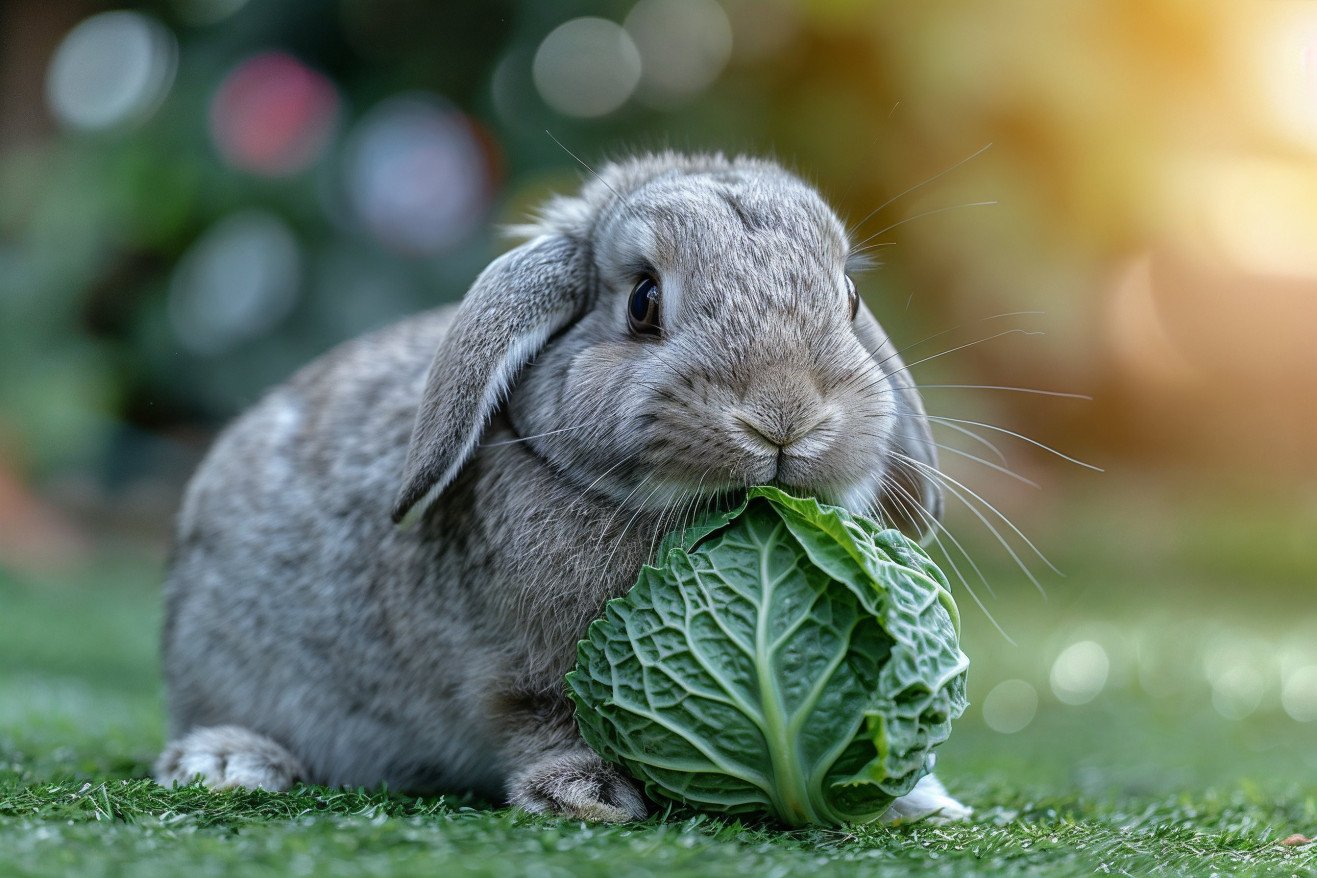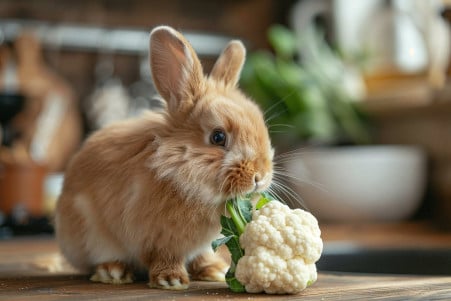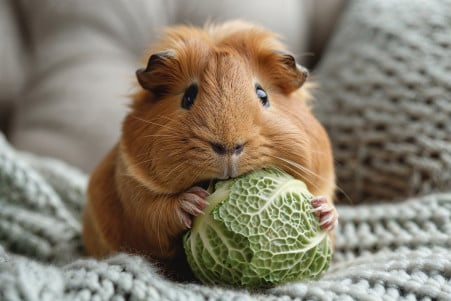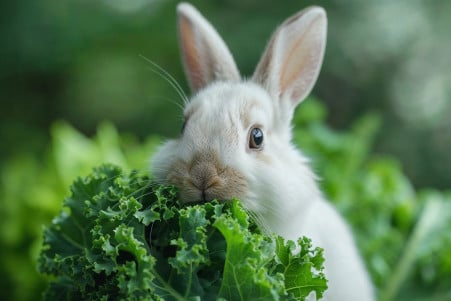Can Rabbits Have Cabbage? A Guide to Feeding Your Bunny Greens
10 February 2024 • Updated 10 February 2024

Rabbits eat a lot of different greens, but where does cabbage fall on the list? Rabbits can eat cabbage, but it should be fed in moderation to avoid upsetting their stomach. It should be introduced slowly and carefully, and you should always opt for dark, leafy cabbages like savoy. Cabbage should also be fed in addition to your rabbit’s regular diet of hay.
To get a complete picture of how cabbage can affect your rabbit’s health, we will thoroughly investigate a range of veterinary opinions and nutritional recommendations. Covering everything from the details of rabbit digestive systems to the ins and outs of their nutritional needs, we will reference trusted sources in the field of small animal medicine.
By analyzing advice from vets and rabbit nutrition experts, we hope to give you a well-rounded understanding of how to safely add cabbage to your rabbit’s diet.
Can rabbits have cabbage?
Rabbit Digestion and the Importance of Fiber
Rabbits have a unique digestive system that has evolved to process a diet that is high in fibrous plant material. This is in contrast to humans, who have a digestive system that is not well-suited to a high-fiber diet.
The rabbit’s digestive system has adapted to handle a continuous intake of high-fiber vegetation, like grasses, which is important for their survival in the wild. According to Supreme Petfoods, the rabbit’s digestive system is characterized by continuously growing teeth and a specialized part of the gut called the cecum.
The cecum is the site of hindgut fermentation, which is the process by which fiber is broken down by a diverse community of microbes.
The cecum is similar to a cow’s rumen and is the key to rabbit digestion, according to Purina Animal Nutrition. In the fermentation chamber of the cecum, microbes ferment fiber to release nutrients and energy. In addition, the fiber that rabbits consume helps to promote the health of the microbes in the cecum, which is important for proper digestion and to prevent digestive upsets.
A diet that is made up mostly of hay provides the high-quality fiber that rabbits need. This type of diet ensures that the microbial community in the cecum stays healthy and supports good overall digestive health.
By feeding their rabbits a diet that is high in fiber, rabbit owners can avoid common digestive problems and help their rabbits stay happy and healthy. It’s important for rabbits to get the right mix of nutrients, including those that are found in cabbage, to stay healthy.
Nutritional Needs of Rabbits
Rabbits need a well-balanced diet that includes vitamins, minerals, and proteins to stay healthy. The Merck Veterinary Manual notes that rabbits need vitamins A, D, and E from their diet, but their gut bacteria can synthesize B vitamins and vitamin K.
It’s important to note that the diet should be specific to the rabbit’s life stage, breed, and activity level, as the nutritional needs of a growing kit are vastly different from those of an adult house rabbit.
Calcium is an important nutrient for rabbits because it helps with bone health and cellular processes, but rabbits have a unique calcium metabolism. Therefore, it’s important to manage their calcium intake to avoid urinary issues, such as bladder sludge and urolithiasis.
It’s also important to make sure that the rabbit’s diet is well-balanced, with hay as the main staple, as it’s important for fiber and dental health. Vegetables, including cabbage, can be used as supplements to the diet to provide variety and additional nutrients.
However, it’s important to manage the amount of these vegetables to ensure that the rabbit’s digestive health and nutritional needs are met. These are all things that are supported by nutritional studies, including research by Joerg Mayer.
In practice, this means that a rabbit’s diet should be based on a foundation of ample hay, supplemented by a variety of vegetables that provide the nutrients the rabbit needs without leading to over- or under-consumption. This is particularly important when considering the role of cabbage in a rabbit’s diet to ensure that it can be a positive part of a rabbit’s overall nutritional intake.
Cabbage in Your Rabbit’s Diet: A Nutritional and Practical Guide
When fed in the right way, cabbage can be a nutritious and healthy part of your rabbit’s diet. Rabbits Life explains that cabbage is packed with vitamins and minerals, including vitamins B6, C, K, and is a good source of dietary fiber and potassium.
That said, it’s important not to go overboard. Pet Keen warns that the sulfur compounds in cabbage can lead to digestive problems like gas and diarrhea, which can be especially dangerous for rabbits since they can’t pass gas.
To add cabbage to your rabbit’s diet, make sure you do so in small amounts and watch for your rabbit’s individual reaction. A slice of cabbage once or twice a week is a good place to start. Rabbits Life recommends Savoy and Bok Choy cabbage, both of which are dark and leafy and tend to be easier for rabbits to digest.
Make sure you watch for signs of digestive upset and always make sure that hay is the main component of your rabbit’s diet, as it’s the fiber in hay that helps keep their digestive system moving. By doing this, you can make sure that cabbage is a healthy addition to your rabbit’s diet that helps improve their nutrition without taking away from the importance of hay.
Calcium Balance in Rabbits: A Fine Line
Rabbits have a unique mineral metabolism, particularly when it comes to calcium absorption. Unlike most other mammals, rabbits absorb a high percentage of dietary calcium, regardless of their physiological requirements. This can make it difficult to maintain the right balance and can lead to health issues.
A review in Veterinary Clinics of North America—Exotic Animal Practice notes that rabbits excrete excess calcium in their urine, which can lead to urinary problems like bladder sludge and urolithiasis when they consume a diet that is too high in calcium.
The dangers of high calcium intake are real. A study in PubMed found that rabbits on high-calcium diets excreted significantly more calcium, leading to an increase in the formation of calcium carbonate crystals in their urine. An RCVS Specialist in Rabbit Medicine explains that while rabbits need a certain amount of dietary calcium to maintain bone health, an excess can lead to urinary sediment and potentially make urinary tract diseases worse.
To ensure that rabbits get the right amount of calcium, it’s important to choose their food carefully to ensure that it contributes to a balanced diet.
Because cabbage is high in calcium, it should be fed in moderation, taking into account the rabbit’s age, health status, and other sources of dietary calcium.
Mixing cabbage with other low-calcium vegetables can help reduce the risks and ensure that the rabbit gets a well-rounded diet that maintains the fine line necessary for good health. This is in line with the general understanding of the nutritional value of cruciferous vegetables in animals, which emphasizes a diet that includes a variety of fresh foods.
Cruciferous Vegetables and Animal Health
Cruciferous vegetables, which include kale, broccoli, and cabbage, are nutrient-dense and have been shown to have health-promoting effects in humans, according to the National Cancer Institute. These vegetables are high in compounds like glucosinolates, which are broken down into biologically active molecules like indoles and isothiocyanates during digestion. These molecules have been shown to have anticancer properties, including inhibiting the growth of tumors and protecting cells from DNA damage.
Interestingly, it has been suggested that the gut microbiome is a key factor in mediating the health effects of cruciferous vegetables. According to a paper in PMC, a 2023 paper by Edward W. Davis showed that the gut microbiota can metabolize glucosinolates to their bioactive forms, which influences the health effects of cruciferous vegetables.
This interaction suggests that for animals, including rabbits, eating cruciferous vegetables like cabbage could help maintain gut health and reduce the risk of disease.
When these results are extended to rabbits, the addition of cabbage to a well-rounded diet aligns with the general understanding of the health benefits of cruciferous vegetables. While the direct anticancer effects have not been studied in rabbits, the benefits for gut health and the potential to manipulate the gut microbiome’s influence make a strong case for including cruciferous vegetables in their diet, with an emphasis on balance and variety.
A Well-Rounded Diet: The Bottom Line on Cabbage and Rabbits
After exploring the ins and outs of rabbit nutrition, the most important thing to remember is that cabbage can be part of a rabbit’s diet, but it should be used in moderation. It has been shown that rabbits have a digestive system that is well-suited to a high-fiber diet that includes forage, with hay being the most important part of their diet.
Cabbage, with its vitamins and fiber, can be a good source of additional nutrients, but it should be used in limited amounts to avoid upsetting a rabbit’s digestive system.
The need to be aware of and control the amount of calcium in a rabbit’s diet has also been made clear. This is especially important when feeding rabbits foods that are high in calcium, like cabbage. It’s important to mix the greens with other foods that are lower in calcium to ensure that the rabbit’s diet is well-balanced.
In summary, cabbage can be part of a rabbit’s diet if it’s introduced in small amounts and the rabbit’s reaction is carefully monitored. By doing this, you can be sure that cabbage will be a healthy addition to a rabbit’s diet.
When you think about the delicate balance between nutrition and health in a rabbit’s diet, it’s clear that every food that’s fed to a pet rabbit should be weighed against their natural diet and their physical needs, and it should always be done with the utmost care and concern for their health.


